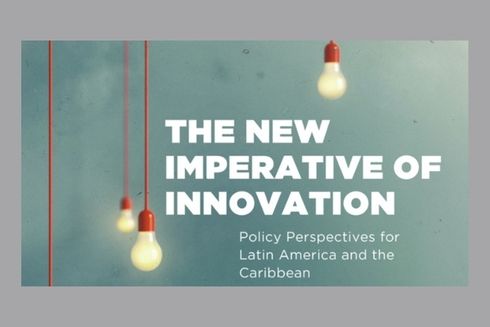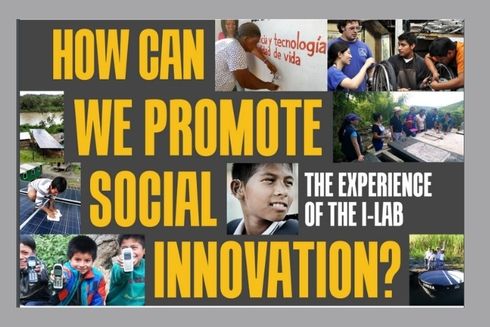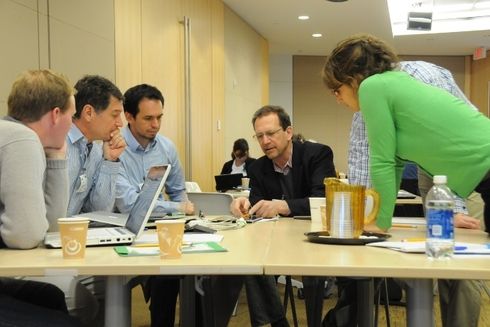Supporting innovation is not a luxury of advanced economies, but rather a key reason why these countries are more prosperous. In the case of emerging countries, innovation has been one of the main components of its accelerated development. The Inter-American Development Bank (IDB), through its Competitiveness, Technology, and Innovation Division, provides funding, technical assistance, and knowledge products to support governments in key action areas.
IDB programs in these areas incorporate common themes, such as training in science, technology, and innovation for advanced human capital; strengthening scientific and technological infrastructure; designing public policies to promote innovation; and strengthening institutional capacity of the agencies and ministries that are responsible for implementing these policies.

Along with the public and private sectors, we support the development of innovation processes in companies and promote incentives for firms to increase their investments in innovation and technological development. We also work to improve firms’ capabilities in quality management, technology transfer, intellectual property, and technology absorption. The goal is for companies to become more productive, contribute to the creation of quality jobs, and compete in international markets.
Discover the lessons learned in 50 years of public policy research aimed at fostering a knowledge-based economy in Latin America and the Caribbean.

Solutions to social problems should not arise by chance but by design. Therefore, we support public and private sector organizations in the generation, implementation, and dissemination of high-impact social innovations. We do so through processes that involve the participation of stakeholders from different sectors and disciplines. We emphasize the inclusion of final beneficiaries in identifying and prioritizing their problems, as well as in implementing and scaling solutions. We promote the use of technologies and other collaborative methodologies to facilitate the coordination of supply and demand and to democratize the innovation process.
Since 2007, the Innovation Lab (I-Lab) of the Inter-American Development Bank (IDB) applies its own approach to social innovation by creating platforms where citizens themselves can define and prioritize their problems, and connect with those who have the capabilities, interests, and resources to solve them: governments, universities, and NGOs at the local, regional and global levels. Watch video
In this brochure, you will learn how several initiatives were implemented in the region.

We support countries by developing diagnostics on their productive sectors, as well as identifying strategic areas to focus their efforts on. The goal is to improve their innovation capabilities and productivity. Likewise, we promote programs aiming at strengthening the linkages and collaboration between companies of a certain sector or territory (clusters), internationalization, and access to markets, as well as the participation of companies in national and global value chains.
The book presents a reassessment of productive development through comprehensive research and analysis of the market failures that prevent transformation, and the government failures that can make policy solutions worse than the actual market problems. The authors analyze different countries’ policies in key areas such as innovation, entrepreneurship, finance, human capital, and internationalization. They also present ideas on how to design institutions with the right incentives, increase the capacity of the public sector over time and promote constructive public-private partnerships.
Through different mechanisms, the IDB supports countries to stimulate dynamic entrepreneurship, which is the emergence of new innovative companies with high growth potential. We support the creation and consolidation of entrepreneurship ecosystems in different countries, regions, and industry sectors, analyzing the degree of evolution of each particular ecosystem and incorporating missing components and connections. We seek to promote an entrepreneurial culture in the region as well as to strengthen incubators, accelerators, and the availability of venture capital for innovative entrepreneurs.
Digital technologies such as the Internet of Things, robotics, artificial intelligence, machine learning, big data, and cloud computing along with increasing connectivity are transforming the economy and production processes into what is called the Fourth Industrial Revolution. We work together with governments in the Region in designing and implementing digital transformation strategies that foster the adoption and use of digital technologies, the emergence of innovations based on digital technologies, and the development of digital business models.

The advent of the knowledge society has highlighted the growing importance of innovation and intellectual assets as sources of competitiveness and long-term economic growth. This book examines human capital and financial inputs into innovation systems, scientific and innovation outputs, innovative behavior by firms, the links between changes in economic structure, technological intensity, and growth, institutional development, and public policy, and the status of one key crosscutting and enabling technological revolution: information and communication technology.

The purpose of this concept note is to serve as a background document for an internal discussion of the Inter-American Development Bank (IDB) about a new approach to address social problems by combining the experience and capabilities of the Bank's public and private sector windows. This document calls for the creation of the Social Innovation Fund (SIF) as an IDB country-specific program that would leverage public and private funds for the purpose of scaling up high-impact social innovation by combining citizens' ideas, governments' enabling mechanisms, and the private sector's flexibility, drive, and capital for innovation.



promotes the generation of social innovations when the problem is not defined and the demand is not structured, involving multiple actors in the process: citizens, public institutions, academia, and the private sector.
The program provides technical assistance grants and investment funding to support product development and innovation policies, business climate reforms, clustering initiatives, and SME development activities in the Caribbean.
Contact Us At [email protected]

